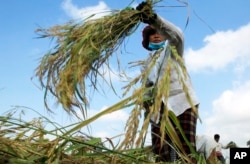An international human rights umbrella says the Southeast Asian region faces the threat of growing conflicts over land between investors and local people unless legal and institutional reforms are put in place.
The warning from the 180-member International Federation for Human Rights (FIDH) comes against a backdrop of significant economic gains and growth across Asia supported by foreign and domestic investment.
The 10-nation Association of Southeast Asian Nations (ASEAN) is looking to spur growth through the ASEAN Economic Cooperation (AEC) and foreign investment alone reached $136.3 billion in 2014.
But the opening to investors seeking land to develop for factories and plantations has triggered conflict with local communities, especially where laws governing land registration and title are weak.
These land disputes, forced evictions and violence have risen as the regional drive for economic growth has accelerated.
FIDH Secretary General Debbie Stothard predicts increasing conflicts between local communities, government and investors unless reforms are implemented.
“What we are going to see in situations in Asia where, as wars and official armed conflicts wind down, we’re going to actually see another type of conflict that also displaces people and also linked to violence and that would be conflict around land grabbing,” Stothard told VOA.
Cambodia
In Cambodia, the FIDH says more than 800,000 people have been affected by land grabbing since 2000.
In 2015, FIDH filed a case with the International Criminal Court asserting that land grabbing in Cambodia had been so “systematic and widespread” it represented a serious international crime.
The sugar industry in Cambodia, with strong links to major international buyers in the food industry, has been under the spotlight, with plantations leading to the displacement of as many as 16,000 people, rights groups said.
In 2008, Thai sugar producer Mitr Phol was granted access to 200 square kilometers of land under a government Economic Land Concession (ELC), offering long term leases. But the land, in Oddor Meanchey province, was already occupied by 2,000 families.
Villager Neoy Ta Am was forced to flee to Thailand when the community was forcibly evicted by government troops in 2008. “When the soldiers came I had already escaped, but I heard from a landlord later they had burnt all the houses,” Neoy Ta Am told VOA through a translator.
Cambodia’s sugar exports accelerated under a European Union (EU) preferential trade program, reaching 65,000 tons in 2013. But allegations over rights abuses and land grabbing have triggered international investigations, with sugar exports to the EU slumping badly last year.
Sugar buyers
The global aid group Oxfam International targeted leading sugar buyers, while the U.S.-based Coca-Cola Company launched a social and environmental audit of key sugar suppliers, including Mitr Phol. PepsiCo also undertook a similar program, with a “zero tolerance” policy for land grabs globally.
Thailand’s National Human Rights Commission accused the Thai producer, Mitr Phol, for the “collapse of the community,” with the Thai company quitting the concession in 2015.
The campaign succeeded in highlighting the villagers’ plight, said Eang Vuthy, executive director of rights group Equitable Cambodia.
“This is probably not the first time but it’s very rare that the foreign investor after many years of investing in Cambodia, now they have to leave the country because of the pressure from the buyers and people on the ground,” Vuthy said.
Premrudee Daoroung, director of advocacy for Project SEVANA Southeast Asia, said large scale development projects across South East Asia are adversely affecting an increasing number of people in the ASEAN region.
“The expansion, the rapid expansion, of the large scale investment across the border which many people think is supporting ASEAN by the gathering of ASEAN and make the flow of investment possible. But the trend that I pointed out is that you have the people who are suffering from the large scale projects,” Premrudee told VOA.
Myanmar
In Myanmar, a government committee – the Central Committee on Confiscated Farmlands and Other Lands – said in early July it planned to settle a wrath of land grabbing cases “within six months.”
Land grabbing cases in Myanmar, including victims under the former military government, gained attention under the reformist administration of former President Thein Sein after he came to power in 2011.
A Farmland Investigation Commission in 2012 was set up to investigate the cases. Government reports said as much as 809,000 hectares (two million acres) of land across the country was considered “confiscated.”
The new government led by State Counselor Aung San Suu Kyi has made settling land dispute issues a priority.
Activists say moves to settle land conflicts will be an important test for the government, especially in cases involving the military and business elites with close ties to the former military, which still holds sway in Myanmar.
But FIDH’s Stothard said the plan by the parliament committee “to clear all land cases in Myanmar is ambitious, but to succeed requires wide-ranging reforms.”
“It’s not really going to work if there are no changes to the laws and to the policies and procedures of the various government departments involved in land acquisition and land leasing,” she said.
Stothard said too often people being arrested and facing trial for illegal assembly are actually farmers protesting the loss of land and homes and forcibly displaced because of inadequate land laws and legal procedures.






